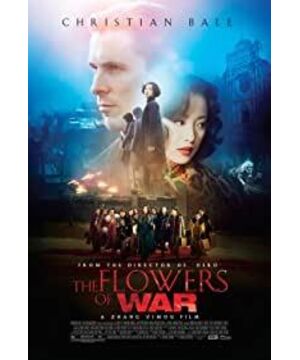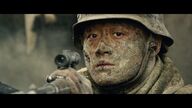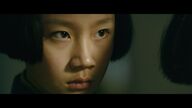I just watched the movie this year. In the past, when I thought of war, what appeared in my mind were cold weapons, swirling dust, and indifferent humanity. In addition, I thought of Nanjing in 1937. I only felt that even the old fragments like black and white photos were soaked in thick and thin. The blood of the people, the faces of those who do not rest their eyes, not only challenge the moral bottom line of human beings, but also deeply nailed into that tragic history.
When Jinling's Thirteen Hairpins was released, I was still at the age of reading girls' cartoons, and paranoidly rejected all works that contained elements of war. When I heard someone say that a song of Qin Huai Jing made enough tears, I instinctively refused to be like them. To bear the unbearable pain of this life again. But now that I watch it, I am filled with emotion. I don’t know if I regret watching this movie until now, or I am glad I waited until I was old enough to understand this movie to watch it, instead of just watching it hastily. I never thought that in the near-doomsday Nanjing in 1937, I could capture the beautiful and pathetic fragrance under the brutal sound of artillery fire.
The Thirteen Hairpins of Jinling are narrated from two perspectives, one is the "priest" who made up for it, and the other is the female student who finally left Nanjing. Their perspectives belong to Western universalism and the Chinese who are being slaughtered. I have always disapproved of the so-called universalism of the West, but in this film, a false priest who should have fled and let go of the fate of others, under Terry's instigation, chose to stay, with When the female student left Nanjing, it really brought tears to my eyes.
In the whole movie, what impressed the most was not that the instructor stayed alone outside the church to protect the students to the point of sacrifice, not that Cardamom hugged Pu Sheng's head and said that he wanted him to marry her, not that Mo Yu lowered his eyes and talked to the fake priest about the past. , it's not the little boy who said that he was going to disguise himself as a woman to protect the female students... Presumably to many people, the most impressive thing was the scene when the women in Qinhuaihe stepped into the church. Like the colorful glazed windows of a church, they light up the entire movie and light up the hearts of every audience member. Delicate hair, gorgeous red makeup, slender curves... As long as they want, even in the background of the outside world, they can make the solemn and tragic church full of the charming atmosphere of the Qinhuai River since ancient times. And their graceful appearance was reminiscent of the fact that they finally wore student clothes to sing the Qinhuai River by fiddling with the strings for cardamom, which made people burst into tears.
Seven years later, there are still many elements of war in Chinese movies, but what impresses the audience is from the Jinling Thirteen Hairpins, the Assembly Number, etc., which are drawn from World War II to impress the audience in the form of remembrance, and now, like the Red Sea, it shows the national prestige. way to shake the audience. And our army, from suicidal sacrificial combat, to now has countless ammunition, constantly upgraded high-tech weapons, scientific and rigorous combat skills... But no matter what kind, these are all things that happened in the past or The story that is happening now, the spirit of the patriots remains unchanged. As everyone who walks into the theater or turns on the computer to watch movies in a warm place, it is the responsibility of everyone to remember that era, the humiliating, cruel Nanjing that directly hit the soul.
View more about The Flowers of War reviews










